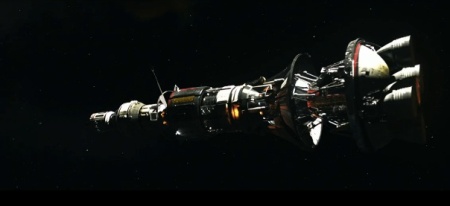“Any sufficiently advanced technology is indistinguishable from magic.” – Arthur C. Clarke
This quote applies, of course, to any number of science fiction films over the last fifty years. But I’ve seen so many reactions on the interweebs to this movie that seemed to be so wrong headed that I wonder if maybe there are several different versions of the movie out there, and I happened to see the one that actually used an extrapolation of science.
Physicist Kip Thorne and producer Lynda Obst started out, much like Kubrick and Clarke, to make a real science fiction movie that was based on fact, or at least logical extrapolations of what we know right now. After a bit, they attracted Steve Spielberg, who in turn suggested Jonathan Nolan to work with them on a screenplay. Ultimately Spielberg had to leave the project, and eventually Nolan got the script to his director brother Christopher Nolan. After some legal wrangling between Paramount and Warner Brothers, the film finally got started. Thorne had many discussions with the Nolans, the effects team, and cast members as the film progressed. For many members of the audience, it probably would not have been necessary to go this far – audiences today will suspend their disbelief for a lot of nonsensical pseudo-science. But the fact they did makes it that much richer for me, and hopefully for a lot of other folks as well. Thorne even wrote a book elaborating on the process, called The Science of Interstellar. I recommend it; not only does it give a good overview of the science used as a basis for the movie, but it also demonstrates how much hard work goes on behind the scenes in a film, sometimes for decades before the film comes out.
Let me say at the outset that I enjoyed the film a great deal. It’s long, at over 2 hours and 45 minutes, and early on it seems a little slow. However, I think that’s just the way I perceive it after all the cgi-laden action/adventure films that have come out over the past decade. This movie doesn’t start with a bang and then just keeps running along. It takes the time to build the relationships in Coop’s (Matthew McConaughey) family for us. However, it seems to take a much shorter time for Coop to be sold on the idea of what probably will be a one-way trip through the wormhole. But then, Michael Caine can be very persuasive, of course!
If you want a recap of the plot, you can always go here. Rather than that, I’d like to reflect on the main theme of the movie, which is, to me, “we can save ourselves with a little bit of time travel, just not the time travel you think.”
Nobody physically goes back in time. (In fact, Thorne is one of scientists best known for explaining why we won’t be able to do that.) However, that doesn’t mean that information can’t be sent back, in one way or another. All you need is a civilization sufficiently advanced to give a father a way to send some information to his daughter – if the father is in the right place, and if the daughter is the right daughter.
WARNING: SPOILERS AHEAD! I’ve read that some folks who have seen the movie took the bit of speculation about the nature of love as being a tangible, physical force that transcends time and space – presented by Anne Hathaway’s character – and ran with it. Sorry, y’all; you weren’t paying attention later on. It is made abundantly clear that the lines in the dust in Murph’s room were created by artificially-created gravity waves. No “Power of Love” here. I can understand some of the confusion, though: gravity is just as difficult to perceive, and no more easily controlled, at least by us. But not by the post-humans. (That’s what I call ’em. For a long time we are sort of led to believe they are some kind of super-beings just doing us a favor so we don’t die off. Coop makes the mental leap that they are our descendants, greatly evolved.) We never see them, and we only really see one effect of their presence. The “time lattice” Coop uses to communicate with Murph is apparently constructed by the post-humans only for that purpose, so he can give her the information she needs for a breakthrough that allows humanity to finally leave Earth, and apparently just in time.
In a way, this is the “transparent aluminum” storyline: In Star Trek IV, Scotty needs “transparent aluminum” to construct a tank for the whales. He gives the formula to a 20th century chemist/engineer so that he can create what Scotty needs. When asked by Dr. McCoy if this was messing with the timeline, Mr. Scott replies, “How do you know he didn’t invent the thing?”
I suppose transparent aluminum isn’t as big a thing in the 24th century as radio is for us. (Although if asked, most people would identify the inventor of radio as Marconi, if they had any idea at all. Grrr. Tesla, folks, Tesla. Look it up.) Still, Scotty wasn’t worried by bootstrapping materials science and creating the classic causality loop.
To make sure that humanity doesn’t die out by being stranded on Earth, the post-humans leave messages for Murph that subtly suggest to Coop that his trip through the wormhole might not be the sheer folly it seems. Therefore, he goes, lots of crazy stuff happens, and he in desperation makes the dive through the black hole’s event horizon. There they have set up the commo lattice – referred to in the film as a tesseract – for him to use to provide signals to Murph at various times of her life, including those that influenced him in deciding to go in the first place. He also can send the data the older version of Murph needs to make the breakthrough in mastering gravity so that we can get off this rock. He does this by manipulating the second hand on a watch through gravitational effects, sending a lot of data collected from inside the event horizon. It seems to take him only a short time to do this, but as we know, time inside a black hole’s event horizon is different from outside it.
So at the end of it all, no aliens – but something that started out as humanity has to help get its ancestors off the planet, or they won’t exist, and they placed the wormhole in orbit around Saturn just for that purpose. Seems like a long shot, but if they had the history of what had happened at that time, all they had to do is make sure the history had a little help to play out correctly.
Those of you who are believers in the “Many Universes” hypothesis probably won’t buy into this as much. In another universe, no wormhole; in yet another, no Coop to save them, etc. If that interpretation could be brought into the plot, the tesseract would have shown Murph in her room in many, many more versions of the situations that first and last provided communication with her. But the film stays firmly rooted in a traditional causality.
It’s not a new idea, but it certainly is played out in a refreshing fashion. I was happy to see a plot that took that much of the audience’s attention to follow in a big mainstream movie.
There are the nitpicks. First, Coop’s training sucks. They pretty much throw him into the ship with three other people, and away they go. That is necessary so that he can be the space cowboy he needs to be, flying the Ranger by hand at several key points in the movie.
Questions have been raised about the Ranger. Why did it need a big chemical-powered, multistage booster to get off Earth, yet takes off and lands under its own power on several other planets, including one with a surface gravity of 1.3 G? I have a possible answer, though it isn’t covered in the movie: antimatter.
The ships are a combination of tech we have now (Rangers are covered with shuttle-like protective tiles, for example) and very high tech (robots with advanced AI.) We know that making antimatter, at least the way we know we can do it right now, is very slow, requires very large equipment, and is very power-hungry. Maybe the Ranger could have taken off on its own, but say it uses 25% of its available fuel to do so. No more fuel after that. Let’s save some by using a sort of pseudo Saturn V that we had laying around. We may have fueled it with the last antimatter we could produce.
The Ranger has little room for fuel stores, so fuel has to be something very energetic, like antimatter, but it can’t take up a lot of space. Maybe a couple of tanks of reaction mass to interact with the antimatter can be squeezed in. Hydrogen is the best choice if the antimatter is really anti hydrogen, but it isn’t very dense so the tanks have to be insulated like crazy and be larger than LOX or H2O tanks would be.
The other nitpick is tidal effects. On the first planet the explorers are confronted with a tidal wave 4000 feet tall. The planet is too close to the black hole – close enough that time slows down a lot, and tidal effects on the ocean are enormous. The same tidal effects should affect everything on the planet, so it eventually will be torn apart. That to me means it isn’t a good candidate for a new home for mankind.
Also, apparently the light from the black hole (huh?) is bright enough to provide light bright as day – at least, a cloudy day in Iceland. Where is that light coming from, really? You would need it to grow crops. None of these planets sounds particularly pleasant or survivable in the long term!
My major gripe about the film is the score. Hans Zimmer was apparently asked by Christopher Nolan to do something unique. He’s done that if unique means boring, loud and simplistic. Sometimes it was so loud it covered important dialog. The score lent more of a feeling of slowness to the movie as it slogged along, repeating the same phrases over and over again. Did Zimmer listen to too much Philip Glass? I would have thought a score like Alan Silvestri’s for The Abyss would have been appropriate, instead. I think this movie would have been a complete knockout, Oscar-worthy, if the score wasn’t so annoying and boring.
Nolan likes using IMAX cameras, he likes using real film over digital recording, and he likes using practical EFX over CGI when possible. All are great, but remember, far more viewings of this movie will be on TV screens than in the theater. Until we all have our 85 inch 4K HDTVs that extra quality won’t be noticed…but a bad score will be.
In summary, I was pleasantly surprised. It’s not the landmark film some people have said it is, but it’s very good, and I highly recommend it to you.





